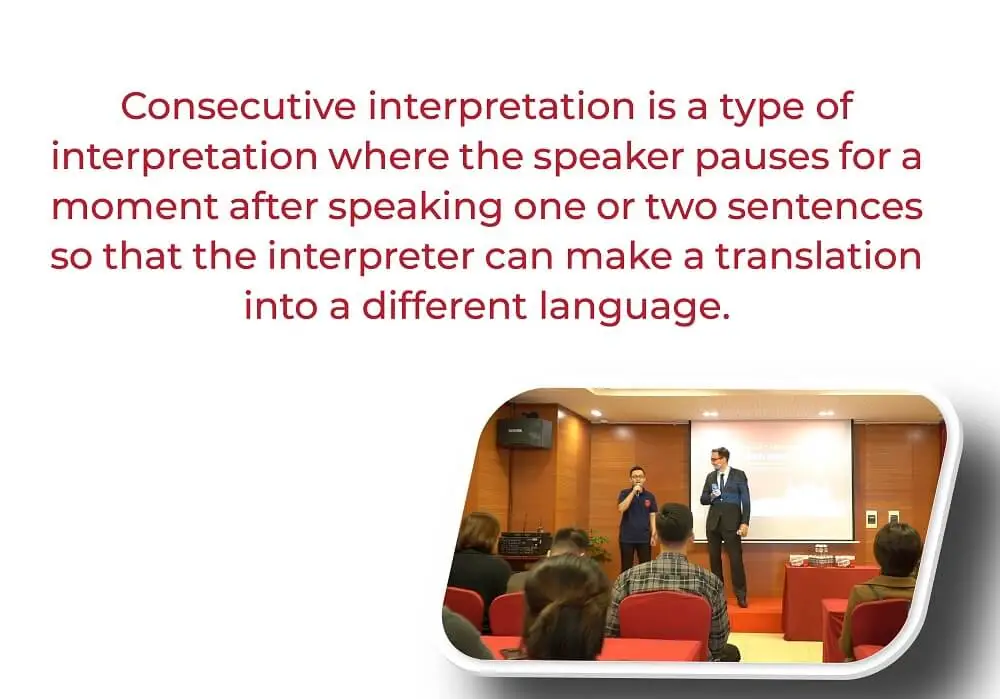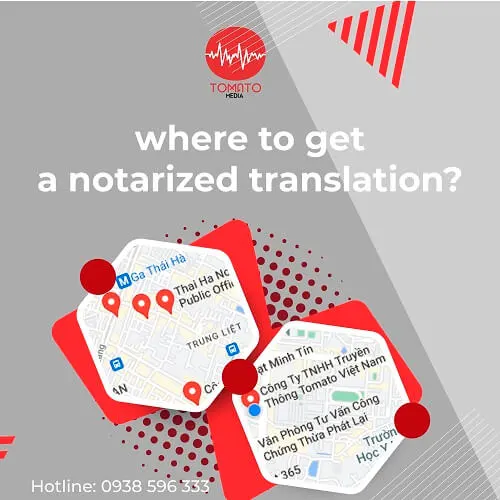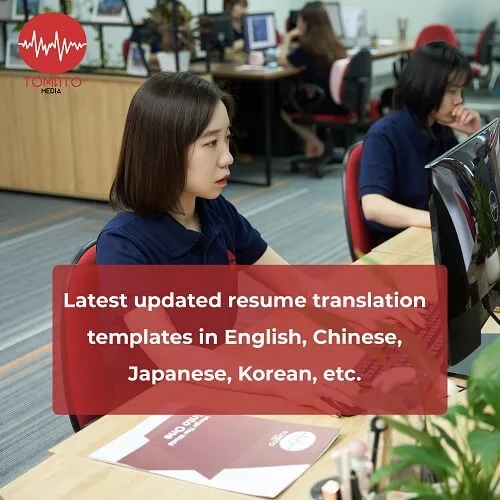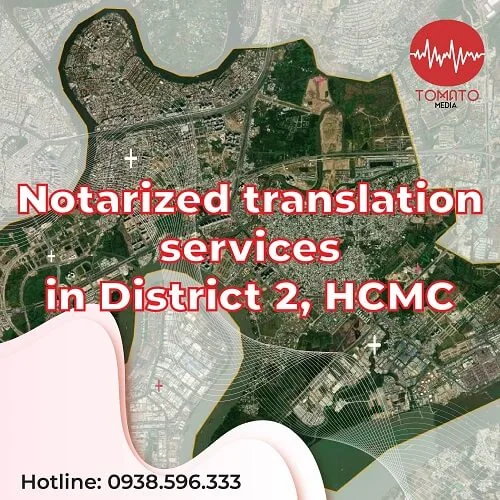When you have documents that need translation and notarization to submit to the authorities for work, study, or travel, you will surely question where to get a notarized translation. In this article, we’ll introduce the locations that will help you get a notarized translation as well as a few things you need to know during [...]
What is consecutive interpretation? Requirements for a consecutive interpreter?
Consecutive interpretation is one of the most popular types of interpretation today. To effectively apply this type of interpretation, you need to know its characteristics. So what is consecutive interpretation? In what situations should consecutive interpretation be applied? What is the requirement for an interpreter when performing consecutive interpretations? Let’s check out this article right away.
Register to find a consecutive interpreter for your event
Please describe your translation needs, we will contact you soon.
NỘI DUNG (CONTENT)
What is consecutive interpretation? What is English consecutive interpretation?
Consecutive interpretation is a type of interpretation where the speaker pauses for a moment after speaking one or two sentences so that the interpreter can make a translation into a different language. This type can take place in person, over the phone, or via video conference.
How consecutive interpretation is done depends on many factors, such as:
- In some situations, consecutive interpreters will take notes, while in other situations they will not.
- In a short consecutive interpretation session, the speaker can say one or two sentences and then pause. The speaker delivers a long speech to fully convey their idea during a lengthy consecutive interpretation session. The interpreter then provides a consecutive translation.
What is English consecutive interpretation? English consecutive interpretation is a type of consecutive interpretation using English as the main language. English consecutive interpretation is also a form of interpretation that many customers choose today.
See also:
English interpreting service with high quality, prestige, good price, and a variety of types
We need to clearly distinguish between the simultaneous interpretation and consecutive interpretation.
- Simultaneous interpretation: This type of interpretation is used for large, multilingual events, in which interpreters sit in soundproof booths and translate the speaker’s words. It requires specialized audio and technical equipment. This type often requires interpreters to work in pairs due to the mental stress of translating at large multilingual events.
- Consecutive Interpretation: Interpreters tend to work alone and do not need any specialized equipment. They only need to prepare notebooks and pencils, as well as other requirements.
Characteristics of consecutive interpretation
Each type of interpretation has its own characteristics. The type of consecutive interpretation has the following basic features:
- Interpreters often walk beside the speaker, explain, discuss, and agree to clarify the meaning or interpretation to ensure accuracy.
- The interpreter can take notes in a notebook.
- The accuracy and completeness of the content are ensured, as the interpreter has time to analyze and consider the translated sentences.
To prepare for a consecutive interpreting session, you need to pay attention to the following:
- The interval between the speaker’s and interpreter’s speeches. This will help you decide if you need to use a notebook.
- You also equip yourself with expertise in the area to be interpreted. This ensures the interpretation process goes smoothly and the translated content is accurate.
What situations and projects should use the consecutive interpretation?
Many situations and projects require consecutive interpretation to ensure that important conversations go smoothly. In particular:
1. Business negotiation
Consecutive interpreting is crucial if you need to conduct business negotiations with people who speak a different language. Interpreters play the role of connecting people in the meeting. Business negotiations can take longer as each person speaks and then pauses for the interpreter to convey their words. However, in order to negotiate successfully, it is necessary to use consecutive interpreters.
There are many ways to classify negotiation in business, such as:
- By number of negotiations: One-time or multiple negotiations
- By negotiation method: Direct and indirect negotiation
- By the negotiation content: Negotiations on goods and prices, negotiations to hire means of transport, negotiations on payment methods, etc.
- By the negotiation results: Win – Win negotiations, Win – Lose negotiations, Lose – Lose negotiations
- By the manner of negotiation: pressure negotiation, concession negotiation, and sympathy negotiation.
2. Press interview
If you need to talk to the media but can’t speak their language, it’s very important to have a consecutive interpreter. The interpreter will convey what you said and vice versa. The following are some typical circumstances for press interviews:
- Interview to collect daily news such as fire, explosion, traffic accidents, robbery, etc.
- Interviews at sporting events, etc.
- Interviews at product launches such as movies, music videos, fashion collections, etc.
3. Personal interview
Not only with press interviews but also with personal interviews, you can use consecutive interpreters. They are present to address the linguistic aspects of the interview process. This type of interview aims to gather information about a particular individual’s family, career, or field of work. Some specific personal interview situations can include:
- Interview with celebrities (singers, actors, MCs, etc.) about their life, work, love and future plans
- Interview with experts about a certain field or their point of view
4. Medical consultancy
If you are going abroad for treatment and cannot speak the language, you will need an interpreter. This person will help you fully understand the medical advice relevant to your treatment.
5. Conferences, seminars
Consecutive interpretation at seminars and conferences requires interpreters to have high concentration, good situational skills, and extensive knowledge. Popular types of conferences and seminars that need interpreters include:
- Customer appreciation conference
- Sales Conference
- New product launch
- Scientific conference
- Conference on cooperation and trade promotion
- Specialized conferences and seminars
- Workshop to share experiences, etc.
6. Professional sports
In sports, athletes playing on teams where they cannot understand the spoken language often rely on a consecutive interpreter to understand the information conveyed. Specific situations such as:
- Training sessions between foreign coaches and athletes
- Communication between athletes and referees in international sports tournaments
- etc.
7. Sightseeing and Touring
Another area where consecutive interpretation is commonly used is for tourism activities, especially excursions and tours done as part of a business trip. Interpreters can help you connect and communicate with foreigners easily.
8. Trials
At the trial, interpreters are asked to interpret for those who do not know the language being spoken at the trial. This is a regulation in court proceedings to ensure the interests of those participating in the trial. Those who do not know the language can bring their own interpreters to the court to act as interpreters. The state will provide judicial support if they are unable to hire one themselves, and the requester is responsible for covering the costs in accordance with the law.
Courts classified by type of dispute include:
- Trial
- International civil and criminal proceedings
- Dispute settlements
- etc.
Above are the situations and events where consecutive interpretation should be applied. We hope you have a clear understanding of when it is necessary for consecutive interpretation.
See also:
- Types of Interpretation – Article: Current types of interpretation | how to choose the most suitable
- What is interpretation? Article: What is interpretation? Proper understanding of interpretation types
Challenges of consecutive interpretation
Consecutive interpretation is not an easy job, and there are always many challenges. Let’s take a look at some of the challenges of consecutive interpretation:
Long interpretation duration
Many lengthy meetings require the interpreter to work continuously. This will affect the interpreter’s health and ability to communicate.
Hard-to-convey speech
The way each speaker’s point of view is expressed can also be an issue of concern to the interpreter. When interpreting, interpreters may encounter some cases, such as:
- The speaker is very straightforward in his or her way of talking
- There are speakers who ramble and sometimes get distracted during the speaking process and change the conversation in a different direction
- People talk too fast and don’t leave time for interpreters to translate
It will be a challenge for interpreters to listen to foreign speakers. Because in consecutive interpretation, the most important thing is that the interpreter must hear clearly what is being said.
Local cultural knowledge
As an interpreter, in addition to being proficient in the source and target languages, one of the challenges that interpreters face is having a deep knowledge of the local culture. The use of language that is not culturally appropriate for listeners is also a problem. Idioms and popular culture references that are not well translated can lead to poor understanding.
Moreover, the interpreter also needs to know the dialects and slang to translate correctly. They will not be able to refer to the material because they must focus on listening to the speaker, analyzing the message, and translating it immediately.
Lack of preparation
It will be a huge challenge if the interpreters receive late or little information about the conference and the speakers. At this point, the interpreter may fall into a situation for which she is not well prepared, which affects the consecutive interpretation process.
Using the wrong type of interpretation
There are situations where consecutive interpretation is not the most appropriate form of language conversion. For example, at an important meeting where the number of participants is more than 100, simultaneous interpretation is needed. If the participants are affected by the restriction on travel between regions during the COVID-19 pandemic, remote interpretation should be used, or in cases of business trips, accompanying interpretation is preferred. Therefore, carefully study the situation and project and choose the most appropriate type of interpretation to achieve the highest efficiency.
Requirements for a consecutive interpreter
A consecutive interpreter needs to be fully equipped to perform his role well. Here are the skills required of a consecutive interpreter:
1. Fluent in two languages
Being fluent in two languages is mandatory for interpreters. Only when one is fluent in the language and has a rich vocabulary will the interpretation be easy and accurate. Moreover, interpreters also need to have basic professional knowledge about their field of interpretation.
2. Good listening – understanding – communication skills
This is an indispensable skill for interpreters. They must also have the skills to listen, analyze, and prioritize the information they receive and process it extremely quickly.
3. Shorthand or other structural notations
It can be said that stenography is an important skill for consecutive interpreters. Because there are long lines, the interpreter is forced to memorize and process them by quickly writing them down. Particularly for interpreters who own a set of abbreviations, taking notes is extremely effective. Normally, interpreters have their own note symbols to ensure all the content to be translated is remembered.
4. Expression skills
Interpreters need to have the skills to express themselves fluently and effectively and to ensure the content of the translation. The interpreter must understand the content to be translated and be able to express it accurately and meaningfully. Avoid cumbersome and confusing expressions. This is not only annoying to the listener but also affects the time and work efficiency of both parties.
5. Cultural awareness
Another important requirement is that interpreters have a deep cultural understanding of the people they are communicating with. This can help them with everything from saying the right sentences to handling sentences and idioms to making sure to use the right tone of voice.
6. Good emotion management
Because interpretation is a profession that involves working in many different environments, professionals must know how to manage their emotions. For example, when interpreting in a legal or medical environment, the interpreter faces many sensitive situations, such as a criminal trial, an emergency, death, etc. The interpreter must be mentally and emotionally stable to do their job well.
Do you need high-quality consecutive interpretation services? Connect with Tomato
Tomato Media is one of the leading providers of high-quality, prestigious translation services nationwide. Tomato provides interpreters for cases such as: technology transfer interpreters, accompanying interpreters to notary offices, interpreters at fields, seminars, conferences, fairs, interpreters for weddings, etc. To register for the service, immediately contact Tomato through the following methods:
- Hotline: 0938 596 333
- Zalo: 0938 596 333
- Email: info@tomatomediavn.com
- Website: https://tomatotranslation.com/
We will contact the customer within 15 minutes after receiving the request for consultation and a detailed and specific quotation.
Frequently asked questions about consecutive interpretation services
The following are the frequently asked questions that we have compiled regarding consecutive interpretation services:
Tips in consecutive interpretation
Translation requires the interpreter to have language ability, memory capacity, and a lot of other factors. This is a challenging form of interpretation, so applying some of the following guidelines will make the interpretation more precise and straightforward:
- Taking quick notes, interpreters can use their own “symbols” to organize ideas, separate ideas, etc.
- Cultivate psychological qualities to be firm, calm, and flexible to handle situations
- Read the script in advance (if any)
What do consecutive interpreters do before different interpretation cases?
The task of a consecutive interpreter is to effectively communicate the information in the conversation. However, depending on the case of translation, interpreters choose the appropriate interpreting style:
- During important negotiations, interpreters often use a formal style, moderate tone of voice, and appropriate speed
- During intimate meetings, dining, and mainly casual conversation, interpreters often use spoken languages to make the atmosphere comfortable
- In formal but cozy meetings, interpreters convey information in a friendly and proper manner, keeping the meeting atmosphere harmonious.
What does Tomato Media offer consecutive interpretation for?
Tomato Media provides consecutive interpretation services for more than 100 specializations, including those with high difficulty such as Health, Law, Information Technology, etc.
Tomato Media provides offline and online consecutive interpretation services nationwide
Tomato Media was born with the mission to “Merge the World into One”, We always want to become a language bridge for all customers who have a translation need. As a result, Tomato Media is one of the high-quality translation units providing interpretation services across 63 provinces and cities across the country.
The article has shared related information with you about consecutive interpretations.
Need a consecutive interpretation service?
Please contact Tomato immediately for the best support for your project.
| Ready to get started? |
Have a large project? |
| GET A QUOTE | ✉ CONTACT US |



















